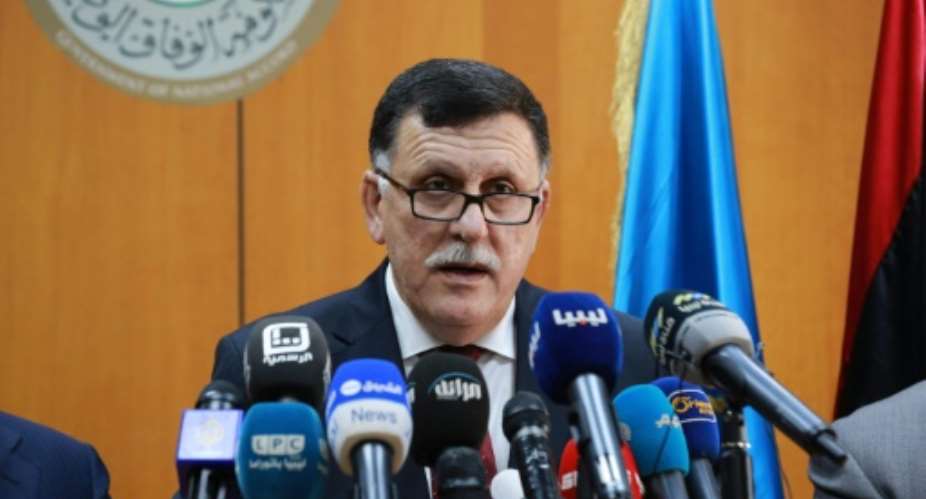Tripoli (AFP) - On March 30, Libya's prime minister-designate Fayez al-Sarraj sailed into Tripoli under naval escort and set up the headquarters of his country's unity government.
After three months in office, how has the Government of National Accord fared in tackling Libya's long list of crises?
What needs doing?
The GNA, the result of a UN-brokered power-sharing deal in December, faces a fearsome set of military, economic and political challenges.
Its allied militias have made major advances against the Islamic State group in its stronghold of Sirte -- but success there would just be the start.
The country's economy, hard-hit in the wake of the 2011 uprising, continues to struggle amid power cuts and a cash crisis at banks.
A rival government in the eastern city of Tobruk is refusing to cede power until Libya's elected parliament passes a repeatedly delayed vote of confidence.
Meanwhile, neither administration can rein in militias that have fought for control of the country since the 2011 fall of former dictator Moamer Kadhafi.
What has the GNA achieved?
Within days of arriving in Tripoli, Sarraj's government had won the loyalty of the main economic institutions, cities and armed groups in western Libya.
Without waiting for a vote of confidence from Tobruk, the GNA took control of key government ministries in Tripoli.
Sarraj has managed to secure a rapprochement between rival central banks and national oil companies.
He has also met figures from both sides of the country, and "continuously stressed the need for unity," said Karima Munir, an independent analyst on Libya.
But the GNA's biggest achievement has been its success in commanding an assault on IS in Sirte, 450 kilometres (280 miles) east of Tripoli.
Since May 12, pro-government forces have cleared IS from 280 kilometres (175 miles) of coastline and surrounded the jihadists inside the city.
Where has the GNA failed?
Politically, the GNA's main challenge is securing a rapprochement with the east.
"The division between east and west has deepened since the Presidential Council's arrival in Tripoli," said Munir.
Easterners are wary of the GNA's reliance on militias.
"The GNA has no authority over these groups," said Munir.
"Sarraj is holding a double edged sword -- they need them to provide security and at the same time they are the cause of the insecurity."
Kidnappings for ransom are on the rise, as are the prices of basic goods. Power cuts are common, long and unpredictable, sometimes affecting the water supply.
Meanwhile, foreign airlines are avoiding the country and Libyans have few options for flying out. Despite a string of foreign delegations, no foreign embassy is currently present in the capital.
The dollar -- officially worth 1.38 Libyan dinars -- has hit 4.55 dinars on the black market, up from 3.00 at the end of February. Few banks have any cash.
"The cash crisis is probably still the most serious failure which shows the GNA's inability to control the economy," Mattia Toaldo, Libya expert with the European Council on Foreign Relations, told AFP.
What after Islamic State?
To effectively govern, Sarraj needs a vote of confidence from the House of Representatives in Tobruk.
"He has failed to address the east of the country, but it is also true that the HoR vote did not happen mostly because a violent minority of its members didn't allow for that," said Toaldo.
The fight against IS delays an east-west conflict that is inevitable unless a political solution is reached.
Sarraj himself has no illusions about the size of his task.
"All we can do is work, by all means possible, to bring our country out of these crises. But there is no magic wand, all we can do is try," Sarraj told AFP in a written response to questions on Sunday.
"I am confident that we can overcome this challenge but if one day I lose that faith, I will not stay one more minute," he said.





 This IMANI job no dey pap; the people you are fighting for are always fighting y...
This IMANI job no dey pap; the people you are fighting for are always fighting y...
 Prof. Naana Opoku-Agyemang has changed; you can see a certain sense of urgency –...
Prof. Naana Opoku-Agyemang has changed; you can see a certain sense of urgency –...
 MFWA Executive Director slams Akoma FM for engaging in ‘irresponsible’ media pra...
MFWA Executive Director slams Akoma FM for engaging in ‘irresponsible’ media pra...
 ‘Women must become millionaires too’ — Prof Jane Naana on establishment of Women...
‘Women must become millionaires too’ — Prof Jane Naana on establishment of Women...
 Some believe only in Ghanaian votes, not Ghana — Kofi Asare jabs politicians
Some believe only in Ghanaian votes, not Ghana — Kofi Asare jabs politicians
 Plan to make BEST sole aggregator of Sentuo Oil Refinery will create market chal...
Plan to make BEST sole aggregator of Sentuo Oil Refinery will create market chal...
 2024 elections: I can't have the man I removed from office as my successor — Aku...
2024 elections: I can't have the man I removed from office as my successor — Aku...
 2024 Elections: Immediate-past NPP Germany Branch Chairman garners massive votes...
2024 Elections: Immediate-past NPP Germany Branch Chairman garners massive votes...
 Gov’t focused on making Ghana energy self-sufficient, eco-friendly – Akufo-Addo
Gov’t focused on making Ghana energy self-sufficient, eco-friendly – Akufo-Addo
 April 25: Cedi sells at GHS13.74 to $1, GHS13.14 on BoG interbank
April 25: Cedi sells at GHS13.74 to $1, GHS13.14 on BoG interbank
